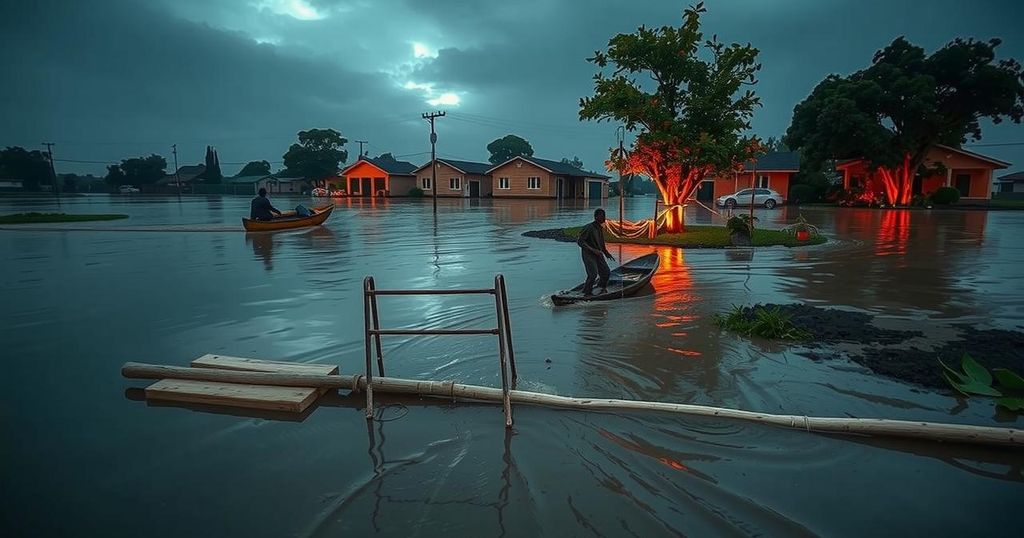Severe Flooding Intensifies Health Crisis in South Sudan: WHO Reports

Severe flooding in South Sudan has displaced over 226,000 individuals, impacting 42 counties and exacerbating an existing health crisis amidst a humanitarian emergency. WHO is distributing emergency health kits and monitoring health impacts, including rising cases of Cholera and Malaria. The floods are linked to climate change, posing long-term risks to health infrastructure and community resilience.
South Sudan is currently experiencing its most severe flooding in decades, causing substantial destruction across the nation. According to reports, over 226,000 individuals have been displaced as homes and livelihoods are destroyed, with roads and critical infrastructure submerged. The United Nations indicates that 42 out of 78 counties in South Sudan have been impacted by this crisis, resulting in 58 health facilities being compromised in five counties and nearly 90 others becoming inaccessible due to washed-out roads, including primary routes to the capital, Juba, where essential tertiary health services are provided. As of early October 2024, approximately 890,000 individuals in flood-affected areas have been adversely affected. The flooding is principally attributed to heavy rains typical during the rainy season from April to November, which have intensified due to climate change. This has overwhelmed communities, leading to permanent displacements. The World Health Organization (WHO) has expressed concern over the exacerbated humanitarian conditions, especially since there are nearly 800,000 refugees and returnees in South Sudan fleeing from ongoing conflicts in neighbouring Sudan. In addition to flooding concerns, two suspected cases of Cholera have been reported in Renk County, a key entry point for refugees coming into South Sudan. Malaria cases are also surging, with reports confirming over 120,000 cases and 31 suspected fatalities by the end of September. Dr. Humphrey Karamagi, WHO’s representative in South Sudan, stated, “People are in a heightened state of vulnerability due to multiple shocks. WHO is committed to work with the Ministry of Health and our partners to ensure that they have access to essential health services while also prioritizing the response to growing humanitarian and health needs.” To mitigate the health impacts of the floods, WHO has distributed approximately 88 metric tonnes of emergency health kits to various locations, including Renk, Bentiu, Malakal, and Bor. These kits are designed to provide medical supplies necessary to treat over 870,000 individuals, comprising cholera treatment kits, antimalarial drugs, and snakebite antivenom. The organization has also dispatched nearly 1,300 malaria kits throughout the country since January 2024, in addition to cholera testing resources. In coordination with the Ministry of Health, WHO is working to enhance the emergency health response and has conducted rapid assessments in affected areas to evaluate the needs on the ground. The agency is also monitoring health implications related to both vector-borne and water-borne diseases resulting from the flooding. WHO continues to advocate for sustainable investments aimed at building resilient health infrastructures that can better withstand climate-related disturbances. Overall, efforts are being made to address the immediate health needs while also strategizing long-term improvements to South Sudan’s health system resilience against future environmental challenges.
The severe flooding in South Sudan underscores the critical intersection between climate change and health emergencies. Frequent and intense rainfall during the annual rainy season has increasingly directed attention to the vulnerability of communities and health infrastructures. The impact of climate-related disasters has amplified the humanitarian crisis in South Sudan, a nation already facing the repercussions of conflict, displacement, and health emergencies. The challenges posed by such crises, including increased risks of vector-borne and water-borne diseases, necessitate urgent interventions and robust coordination among health agencies, local governments, and international partners.
In conclusion, the flooding in South Sudan presents a multifaceted health crisis that requires immediate and sustained intervention. The WHO is actively mobilizing resources and coordinating efforts to deliver essential health services and address the rising threats of diseases such as Cholera and Malaria. The situation calls for comprehensive strategies that not only respond to this immediate emergency but also invest in the long-term resilience of health systems in the face of ongoing climate challenges.
Original Source: sudantribune.com






